
Empathy: seeing your world from an inside-out point-of-view
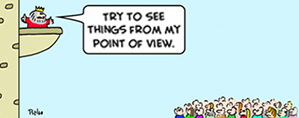
Empathy is the understanding of another person's situation, feelings, and motives.
It's hard to get past one's own ego and see a situation through someone else's eyes but it's a game changer - it will open your mind to possibilities, agreement, and understanding. Empathy is the fine line between projecting your own experiences on others and actually understanding what they are going through. Two people who have a similar experience might take completely different lessons away from it. Healthy relationships cannot exist without empathy - is the key to cooperation. Too many think only of themselves when making decisions. Every one you know or will meet is messed up in some way. Everybody has some baggage. Some disability, handicap, disadvantage. Many of us are dealing with Negative Stress Obsessions that can affect or prevent us from making rational intelligent decisions and choices:
• intense anger
• major debt and poverty
• severe grief, sadness, or depression
• illness and disease (including alcoholism & drug abuse)
• sleep deprivation
• work trauma: firing, demotion, failure
• needy screaming children
• nasty divorce
• emergencies, natural disasters
• running to catch a flite or make a meeting
• war, fighting
Empathy is not something that can be faked. When it does not occur naturally, it usually comes after some degree of epiphany. If you want people to enjoy being in your presence you must be considerate and think about their feelings in conjunction with your own. Empathy, or politeness, or manners, is there at the start of healthy relationships and it holds them together. Empathy is what we commonly call "walking in another person's shoes." Types of empathy:
• Emotional empathy is actually feeling what others are feeling. We often experience emotional empathy when we watch sad movies, see other people cry or hear about national tragedies.
• Cognitive empathy is the ability to appreciate - without reacting emotionally - how another person sees a situation.
• Compassionate empathy or empathetic concern arises when emotional and cognitive empathy team up to produce a desire to do something. This is the concept we want to encourage in ourselves and others.
As children's book author Daron Roberts says, empathy is feeling with someone - sympathy is when you feel for someone. Empathy is about staying out of judgment and offering neutral active listening, which is tough - immediately when things are difficult we often want to prescribe solutions. But we have to step out of the problem and engage the active listening part of our brains. Empathy is the foundation of connection - the gateway for people to understand and learn.
Empathy may have conferred an evolutionary advantage to humans. Since we're tribal creatures, empathizing with others increased our sense of commitment to the community and to those in it. Additionally, it permitted us greater understanding of not just our own feelings, but those of others. It is essential to cooperation, problem-solving, and to human functioning in general. Researchers have described it as "social glue, binding people together and creating harmonious relationships." Empathetic people are more likely to forgive others for small errors, like running late. Asking narcissists to imagine themselves in others' shoes can help shrink their big heads. "Manners are a way of showing other people we care about them."

What empathic people would not say
These statements may sound sympathetic but they are not empathic responses.
I know exactly what you are feeling. I've been there, done that.
You are making it about you and marginalizing the uniqueness of the person's experience. As a general rule, if the first word out of your mouth is the pronoun “I", the chances are excellent that you aren't displaying empathy.
It could always be worse.
Telling someone in pain that it's really not so bad is undercutting and insulting. Fight the need to fill the air with words - just grab a seat and listen, because that's what true empathy looks like. No one needs to feel grateful that what happened was only a category-three hurricane and not a tsunami.
Try to be positive. Maybe it was meant to be.
A true empath leaves their stash of positive-thinking magnets and memes at home. This kind of cheerleading, "Life gave you lemons? Let's make lemonade!" is not what someone needs to hear. For most of us, the process of sorting out our feelings when something hurtful or destructive happens is a long one, and will need support. That support does not include people suggesting that this is a trial which will make us stronger - or any other clichés of that ilk.
Don't you think it's time to move on?
Your inner cheerleader may think this is helpful, but the emotional distance implicit in sympathy becomes fully realized with this statement suggesting that grief, mourning, or recovery come with a use-by-date stamp like perishables in the supermarket, and that “wallowing" is bad for the soul. Unless you intend to make it clear to the person that you are sick and tired of their story - and you really don't mind losing the relationship - no one except the person suffering loss can decide when the moment is right to move on. Empathy is not judgmental.
The world seems completely different based on your point of view:
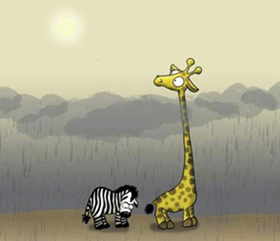

Only when you know what people care about and what reasons they have for their views will you have a chance of persuading them. Effective persuasion demands that we practice seeing the world from another point of view.

Some examples of empathy
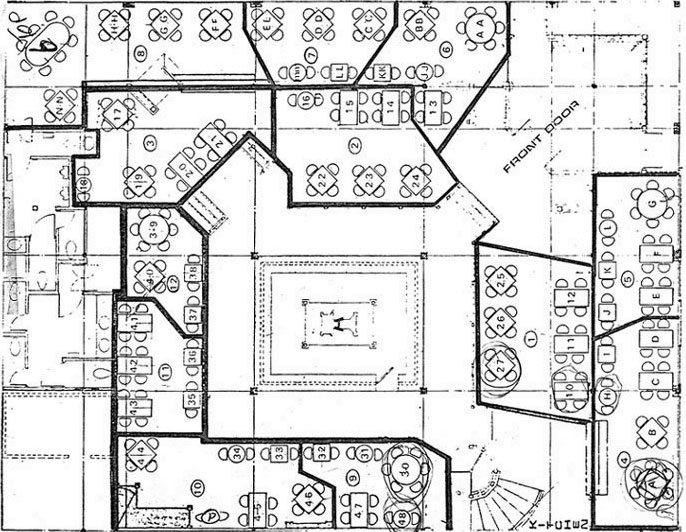


The new system, from the PoV of the newbie-in-training, requires one to learn only the lead tables (which are numbered in tens digits from 10 to 60) and then count as they walk down the row from the kitchen. The lead tables are sequenced in order from the starting point of the kitchen (where all food will be coming from). The servers agreed the new system was easier and made more sense.
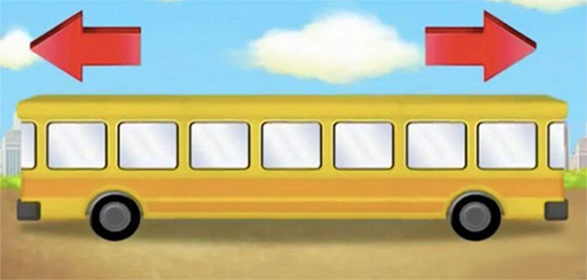
The puzzle above is to determine which direction the bus is traveling. At first glance, there doesn't appear to be enough information, no obvious clues. Once the viewer empathizes with the riders or the driver, it is easier to notice that there is no door on this side of the bus. Doors on busses (in the US) are on the right side of the bus as it moves forward. Therefore, the bus above must be moving to the left.
Below, the puzzle is to deduce which number belongs in the used parking space. The pattern of numbers is unusual - 16, 6, 68, 88, __, 98. There are some subtle clues from the typeface the numbers are printed in and the unusual notion of writing 6 as 06. If a viewer puts themself in the role of the driver of a car pulling into these spaces, they would see that the driver views the numbers from the top to the bottom of the rendering. Aha! Now, we see that the numbers are 86, __, 88, 89, 90, 91.
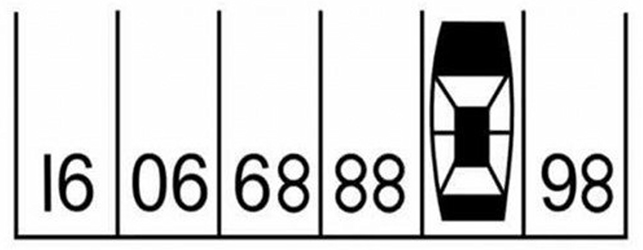
Narcissism - the opposite of empathy
Narcissus, 1590s, Caravaggio. Echo and Narcissus, 1903, John William Waterhouse.


According to Greek mythology, Narcissus was a handsome youth who fell in love with his own reflection in a pool of water. Unable to embrace the watery image, he pined away. Today, narcissists typically display most of the following traits:
• Characterized by egotism, vanity, pride, and selfishness
• An obvious self-focus in personal exchanges and conversations
• Hypersensitivity to any insults or perceived insults
• Flattery towards people who admire and affirm them
• Pretending to be more important than they really are
• Bragging (subtly but persistently) and exaggerating their achievements
• Inability to view the world from the perspective of other people
The alternative to ego-driven narcissism is empathy, using tunnel vision to see as the reader sees.
How to be more empathetic
Nearly everyone in the world believes their job to be difficult. Ford empathized.
Empathy as a design objective
Poor design is more likely when the designer's ego gets in the way of efficient problem-solving. Most designers are self-absorbed, egotistical, and narcissistic.
The two most important keys to solving design problems effectively
Seeing the client's problem through their eyes, seeing an ad or design piece through eyes of intended audience. First, understand who that is and how they see the world. Likes, dislikes, foods, music. Actors practice the craft of seeing the world as someone else. Designers should, also. Maybe even take classes in acting or perform in community theater.
Look past your own ego. It's not about you. It's about effectively communicating the proper message to persuade and motivate.
How is the viewer perceiving your work? Is it connecting? Consider the 6 views of an elephant

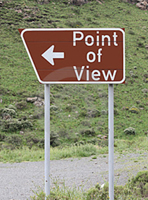
Six blind men came upon an elephant, each touched a different part of the animal, and each formed a conclusion based on what they had experienced.

A rope, a wall, a leaf, a tree trunk, a snake, a spear.
They based their conclusion on their prior experiences and knowledge. If they had never felt a spear, they would not conclude the tusk was a spear. Those two items would not connect in their minds. So often, the design audience comes at a piece from unique experiences and viewpoints. It is the designer's job to strive to connect to as many of those in the target market as possible.
Empathy & Design
By Michael Owen, Designer and maker of user-centered products
Being parents of two small children means my wife often takes pictures of our kids and their achievements. She rarely takes the photographs from their eye level. My daughter sees the world from her height. My wife's photos don't capture that - making it harder for the viewer to empathize with my daughter's world.
Empathy is great for user-centered design
Getting on people's level really is design at its core. Designers solve problems and are best placed to do this when they can understand who the users are and empathize with what they want to do. Talking with users helps the designer better understand them and their needs. This is certainly more work. Without empathy for every user's needs, it's hard for designers and makers to see that the reward is worth all the extra work.
Empathy is great for building new things
Change can sometimes cause stress and anxiety. Designers can get caught up in changing things when there isn't a user need to do so. Seeing change from a user's perspective helps identify what can change and when. Empathy will also help to identify any gaps in user knowledge. You can then progressively reveal new functionality at the right pace, reducing user anxiety and stress.
Empathy is great for working in teams
Working with others is the best way to solve problems but every team has their problems. In situations where people aren't working well together, Empathy to someone's point of view is a great way to resolve conflict. Google has spent time researching what makes a good team. One of the secrets of good teams, Google concluded, was high social sensitivities. Team members who can empathize with how others feel. Appreciating other points of view and understanding how they are feeling can help teams creatively solve problems and produce better work. Good design is inclusive. It's about solving problems for others. And that is why empathy is one of the most powerful design tools you have.
Natural Stupidity is becoming dangerous
By Carlos E. Perez, edited by Jim Watson
Humans from the beginning of their life are driven to seek meaning. The simplest explanations to this are going to be the most naturally appealing ones. Civilization will naturally create religion and civil regulations to not only create a necessary shared understanding of acceptable behavior but one that is driven by our need for meaning. “Natural Stupidity" is basically our lack of meaning, lack of memory, inability to think fast and inability to process too much information. The current systems that we have in place provide products and services to substitute these inabilities. It is the natural tendency to seek out the method of least action. That is, the method that requires lest effort or the laziest thing that we can do.
We collectively become dumber when we:
• We use GPS to guide us around an unfamiliar place only to realize later that we have no ability to get to that place again without the aid of a GPS. Not only is our directional instinct diminished because of lack of use, but so are our own memories.
• We lose our ability to recall due to our overuse of Google. We now recall more as to how we can search for something rather than the details of that something.
• Relinquish responsibility and accountability to the automation or artificial intelligence that furnishes us with cognitive assistance.
• Avoid questioning the positions of our religious leaders and ignore obviously repugnant behavior in defense of our own beliefs.
• Avoid verifying our history and cling to untrue historical information to justify our beliefs. This is the case for Neo-Nazis and Confederates who would like to imagine a more benevolent and just past.
• Ignore common sense by following algorithms in enforcement of procedures. Like the United Airlines where a 70 year old doctor was assaulted and removed from an airline just because the crew blindly followed protocol instead of their own common sense.
• Don't hold accountable organizations that employ information overload in the form of massive disinformation to mold public opinion.
Memories require not only storage but also the capability of recall. Throughout history, religion and law has been transcribed in scrolls, books and now in automation (see: blockchain). Money is a form of memory, that is, once possession of it is a measure of one's ability to acquire goods and services.
Mankind created computers to automate the math that we invented. Computers not only store memories but are able to perform laborious and error-free computations. We find it inconvenient to use cash in that we have to calculate in our minds the amount of change so as to guard against error. We have time keeping devices so that we don't need to look into the heavens to determine the time of day. We have GPS devices to help us avoid reading a map and calculating a path to our destination.
Knowledge-driven economies have accelerated our consumption of information. However, our brains have not magically evolved to process this fire-hose of information. The device that we use to process more information are services that curate information and exhaust it out in more easily digestible forms. Today, social networks have become our primary tools for curating and receiving new information about the world.
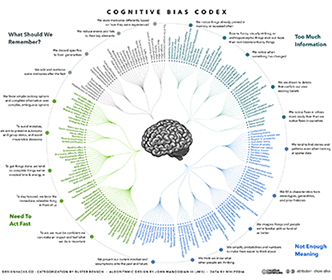
In the Cognitive Bias Codex (pdf here) found at Wikipedia, there are 4 categories that are the drivers of theses biases: “Too Much Information", “Not Enough Meaning", “Need to Act Fast" and "What Should we Remember?"
Our world requires more automation to run efficiently and sustainably. The products and services that will be in demand are the products that compensate for our inadequacies. The clear downside of this is that with every assist, the less we exercise our already weak facilities.
The only people maintaining their smarts are the few people willing to constantly exercise their smarts. Meanwhile, we have a population that is becoming more out of shape and lazy with their own mental faculties. We imagine ourselves to being smarter because we can multi-task more. Yet, our brains have not evolved to do multi-tasking well. Recent research has shown that pigeons have greater multi-tasking capabilities than humans. It is just ironic that we've taken pride in our new found multi-tasking skills only to discover that we are dumber at it than pigeons.
The immediate, clear and present danger is that Natural Stupidity has taken over this world and we are seeing daily occurrences of this in our public discourse.
www.jamesrobertwatson.com/empathy.html